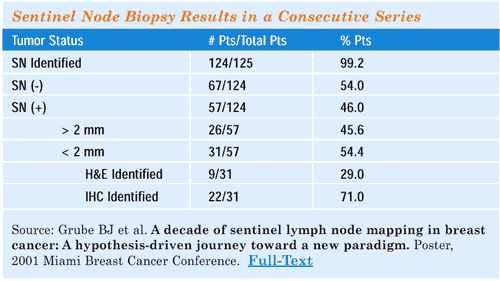|
You
are here: Home: BCU 5|2001: Section 3

Section 3
Sentinel Node Biopsy: Implications to Medical Oncologists
SELECTION OF PATIENTS
Sentinel node biopsy is appropriate for the overwhelming majority
of patients. Sometimes there are technical limitations — for
example when the cancer is in the axilla — not an infrequent
site of breast cancer. Obviously, the closer the cancer is to the
axillary nodes, the harder the mapping. We also have to be cautious
when there are multiple invasive cancers in the breast, because
even though it appears that the breast drains to common nodes, that
still is an unknown question. We also have to be cautious with stage
III breast cancers. Lymph nodes replaced with tumor may not have
lymphatic flow, and there also is the issue of the effects of inflammatory
carcinoma on the skin. But outside of those rare exceptions, sentinel
node biopsy is absolutely an appropriate treatment.There has been
some concern that the sentinel node in a patient who’s already
had a breast biopsy is not accurate.That’s absolutely not true.
It works just as well whether the tumor is in the breast or not.
—Patrick Borgen, MD
Select Publications
IMPLICATIONS OF ENHANCED PATHOLOGY
A key issue for medical oncologists is interpretation
of enhanced pathology on a single sentinel node as opposed to pathology
on 20 axillary lymph nodes. The greatest challenge is the sentinel
lymph node with one IHC-positive cell in the subcapsular sinus.
Is that metastatic breast cancer? Is it clinically relevant, and
should it be treated as N1 disease? Should more surgery be undertaken?
Another critical issue is integrating sentinel node mapping into
the growing field of neoadjuvant chemotherapy. Should patients have
sentinel node mapping before or after chemotherapy? Should it be
trusted after chemotherapy? Sentinel node mapping is an exploding
area right now, and medical oncologists need to be really keyed
into it.
—Patrick Borgen, MD

Page
1 of 3
Next page
|
|
